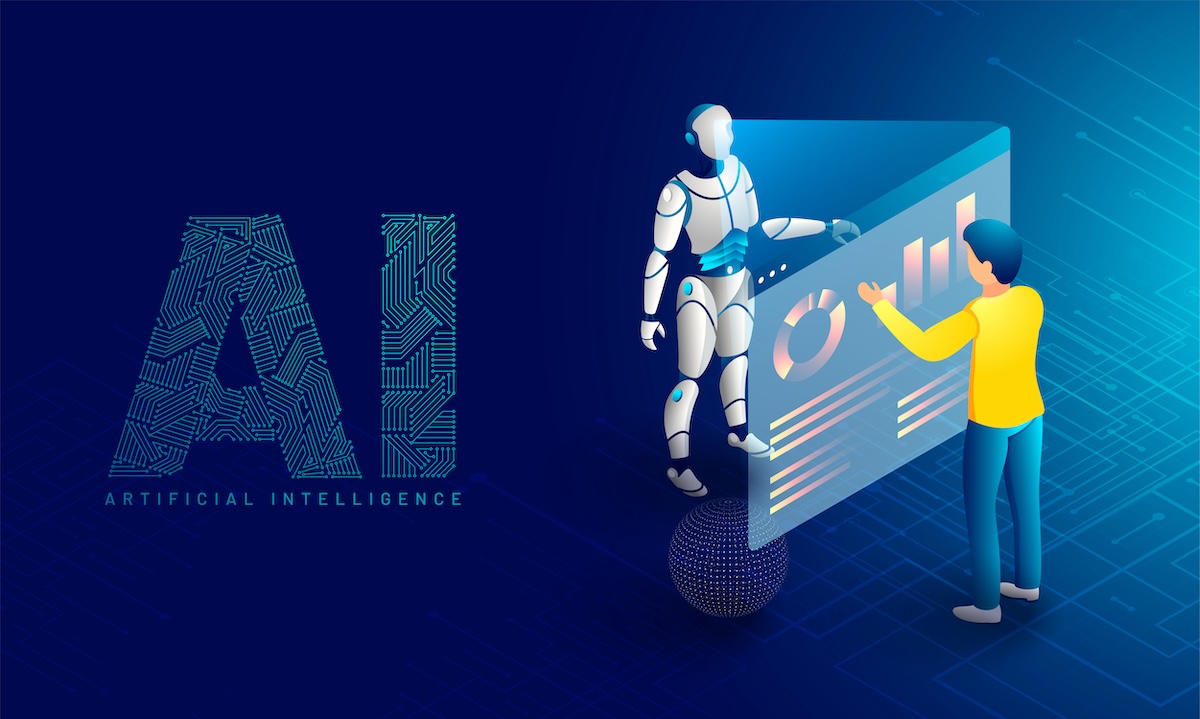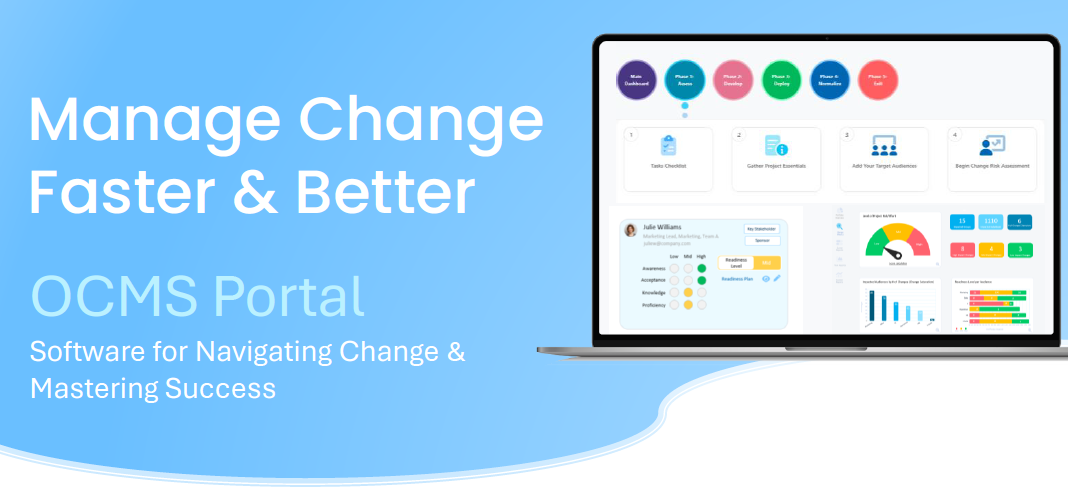Unleash The Change Storm: How AI Can Supercharge Your Transformation
Change is the lifeblood of any successful organization. New technologies, evolving markets, and shifting customer demands constantly necessitate adjustments to stay afloat. However, navigating change can be a treacherous journey, fraught with uncertainty and potential pitfalls.
Here’s where Artificial Intelligence (AI) steps in, offering a powerful tool for anticipating and mitigating the organizational impacts of change initiatives. AI impact on jobs often paint a dystopian future, but AI assessment tools offer a more proactive approach to managing change and ensuring a successful human-AI collaboration.

Forget the outdated “survive the change” mentality! This article dives into the transformative power of AI assessment. We’ll explore how AI goes beyond traditional change management, offering a proactive approach to anticipate and mitigate the impacts of change initiatives, ultimately leading to a more successful transformation journey.
Watch a summary below:
Story Highlights
|
AI Impact on Workforce: From Job Anxiety to Strategic Foresight
The rise of AI has sparked concerns about job displacement, leading to anxieties within the workforce. However, AI assessment offers a powerful tool to move beyond fear and into strategic foresight. By analyzing vast amounts of data, AI can predict potential impacts on employee roles, including predicting employee attrition.
This advanced warning allows organizations to develop proactive reskilling and upskilling initiatives, mitigating job losses and ensuring a smoother transition for the workforce as AI integrates more seamlessly within the organization.
The AI Impact on Jobs: Friend or Foe?
Automation powered by AI is sparking concerns about job losses in various industries. While automation might replace certain repetitive tasks, it’s crucial to recognize AI as a potential collaborator, not just a competitor. AI assessment tools can empower organizations to forecast the impact of change not just on jobs, but on the entire organizational ecosystem.
What is Impact Assessment and Why Is It Important?
Impact assessment is a systematic process of analyzing the potential consequences of a proposed change initiative. Traditionally, this has been a human-driven endeavor, relying on expert opinions and historical data. However, AI introduces a new dimension to impact assessment: increased accuracy, granularity, and predictive power.
Enter the Stage: Harnessing the Power of AI Assessment
AI-powered tools can analyze immense amounts of data, from employee skill sets and workload distribution to customer trends and market shifts. This allows for a more comprehensive understanding of the ripple effects that accompany any significant change.
By incorporating AI into your organizational impact assessment process, you can unlock a wealth of benefits, including many change managers never knew were possible.
Unbiased Analysis: AI algorithms are less susceptible to human biases that can skew traditional impact assessments. Data-driven insights enable a more objective evaluation of potential outcomes.
Increased Granularity: AI can delve deeper, analyzing the impact on specific teams, departments, and even individual roles. This level of detail allows for more targeted interventions and mitigation strategies.
Improved Scenario Planning: Through simulations and predictive modeling, AI tools can help you assess the impact of different change scenarios. This allows for a more strategic approach with a higher chance of success.
Enhanced Communication: AI-generated reports can visualize complex data, leading to more effective communication with stakeholders concerning the potential impacts of change.
Don’t miss: The Power of Change Management AI
Do you have any questions about what is an impact assessment or are the organizational impacts of AI? Please reach out and let us know!
Beyond the Hype: Addressing Concerns about AI in the Workplace
While AI promises a wealth of benefits, navigating its implementation requires acknowledging and addressing some key concerns:
- Black Box Effect: Some AI models can be opaque, making it challenging to understand the reasoning behind their predictions. Transparency and explainability should be prioritized.
- Bias in Data: AI models are only as good as the data they are trained on. Ensure you’re using unbiased and representative data sets to avoid perpetuating existing biases.
- Job Displacement Fears: Openly communicate the role of AI and emphasize its collaborative nature. Focus on reskilling and upskilling initiatives to help employees adapt to changing job landscapes.
By proactively addressing these concerns, organizations can foster trust in AI and harness its full potential for a more human-centered and successful transformation.

Contact us if you have any questions or feedback about this guide on AI impact assessments. Also, let us know if you have examples of AI impact assessment templates that you would like to share to help other change management practitioners.
Implementing AI Assessment: A Step-by-Step Guide
Integrating AI into your impact assessment process requires careful planning and execution. Think of it like embarking on a crucial voyage; a well-charted course ensures you reach your destination smoothly and efficiently. This roadmap will equip you with the essential steps to navigate this journey and unlock the full potential of AI for a more informed and successful change management strategy.
Define Your Change Initiative
Clearly outline the proposed change and its objectives. This will guide the data collection and analysis process.
Identify Key Impact Areas
Determine the aspects of your organization that will likely be affected by the change. This could include workforce, workflows, technology infrastructure, and customer interactions.
Data Collection and Preparation
Gather relevant data points pertaining to the identified impact areas. Clean and organize the data for optimal analysis by AI tools.
Choose the Right AI Tool
Select an AI assessment tool that aligns with your specific needs and data format. Consider factors like scalability, ease of use, and compatibility with your existing infrastructure.

Develop Scenarios and Simulations
Collaborate with stakeholders to define different change scenarios and potential outcomes. Utilize the AI tool to run simulations, evaluating the impact of each scenario on the identified impact areas.
Analyze Results and Develop Mitigation Strategies
Interpret the AI-generated reports and visualizations. Use these insights to identify potential risks and opportunities associated with each change scenario. Develop targeted mitigation strategies to address any negative impacts and maximize positive outcomes.
Communication and Feedback
Effectively communicate the findings of the AI assessment to stakeholders, including leadership, employees, and potentially even clients or partners. Be transparent about both the opportunities and challenges presented by the proposed change. Incorporate feedback from stakeholders to refine your change approach and mitigation strategies
Monitoring and Continuous Improvement
The impact of change is rarely a one-time event. Implement a monitoring system to track the actual impacts of the change initiative over time. Use this data to further refine your AI assessment models and continuously improve your change management practices.
See Also: Top Guide on Understanding Copilot for Microsoft 365
Beyond the Algorithm: The Human Touch in a Tech-Driven Future
While AI offers undeniable advantages in impact assessment, the human element remains crucial. AI is a powerful tool, but it cannot replace the strategic thinking, creativity, and emotional intelligence needed to successfully navigate organizational change.
Here’s how humans and AI can work together harmoniously:
- Humans define the problem and set goals for AI analysis. AI excels at crunching data and generating insights, but it needs human guidance to identify the relevant questions.
- Humans interpret AI outputs and make informed decisions. AI can provide a wealth of information, but humans need to analyze this data within the broader context of the organization and its goals.
- Humans communicate change effectively and build trust with stakeholders. While AI can generate reports, it lacks the interpersonal skills necessary to engage and reassure employees about upcoming changes.
Ultimately, AI assessment is most effective when used as a tool to empower human decision-making in the complex landscape of organizational change.
Please let us know if you have any feedback on the topic of what is an impact assessment and if you want more information on the full AI impact on jobs. We’d love to hear from you!
Conclusion: The Future of Change: Powered by AI
By embracing a data-driven approach to impact assessment, organizations can navigate change with greater confidence. AI can illuminate potential challenges, uncover hidden opportunities, and ultimately pave the way for a smoother transition. Remember, successful change management is not about surviving change, but thriving within it. By leveraging the power of AI assessment, you can equip your organization to not just weather the storm, but emerge stronger and more adaptable than ever before.
Beyond Efficiency: Predicting Organizational Impacts with AI Impact Assessment
Leading successful change requires clear direction and adaptable tools. That’s where OCMS Portal comes in. Our cloud-based platform empowers you to navigate organizational change with confidence, regardless of your preferred approach.
Leveraging AI? OCMS Portal seamlessly integrates with your existing AI strategies, providing real-time insights to inform your direction. It also includes auto-generated engagement plans, built in surveys, and much more.
Find out more and get started with a free trial.
FAQ: Mitigating the AI Impact on Jobs
What is impact assessment and why is it important?
Impact assessment is a systematic process of analyzing the potential consequences of a proposed change initiative. Traditionally, this has been a human-driven endeavor, relying on expert opinions and historical data. However, AI introduces a new dimension to impact assessment: increased accuracy, granularity, and predictive power.
What is the AI impact on change management jobs?
The rise of AI has sparked concerns about job displacement, leading to anxieties within the workforce. However, AI assessment offers a powerful tool to move beyond fear and into strategic foresight. By analyzing vast amounts of data, AI can predict potential impacts on employee roles, including predicting employee attrition.
How can an AI assessment help us anticipate the organizational impacts of a change?
AI-powered tools can analyze immense amounts of data, from employee skill sets and workload distribution to customer trends and market shifts. This allows for a more comprehensive understanding of the ripple effects that accompany any significant change. By incorporating AI into your organizational impact assessment process, you can unlock a wealth of benefits, including many change managers never knew were possible.
AI is powerful, but should we still do a human impact assessment?
While AI offers powerful tools, successful change management still requires human expertise. Humans define the problem, interpret AI outputs, communicate effectively with stakeholders, and make final decisions. AI empowers humans to navigate change with greater confidence emphasizing the unique and important Human-AI collaboration.
Should we fear AI impact on jobs?
AI impact on jobs often paints a dystopian future, but AI assessment tools offer a more proactive approach to managing change and ensuring a successful human-AI collaboration.
Note: Content on OCM Solution's ocmsolution.com website is protected by copyright. Should you have any questions or comments regarding this OCM Solutions page, please reach out to Ogbe Airiodion (Change Management Lead) or the OCM Solutions Team today.
External Sources: stock.adobe.com



